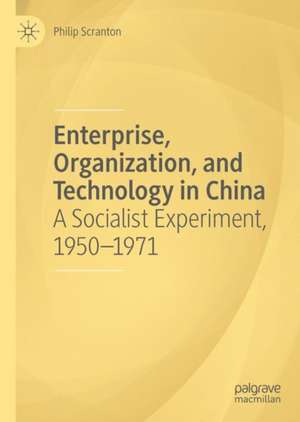Enterprise, Organization, and Technology in China: A Socialist Experiment, 1950−1971
Autor Philip Scrantonen Limba Engleză Hardback – 23 ian 2019
Readers can anticipate a granular, bottom-up analysis of how businesses worked day-to-day in a planned economy, how enterprise practices and technological strategies shifted during the first postwar generation, how managers and technicians emerged after the capitalist exodus, how organizations experimented and adapted, and how the controversies and convulsions of the PRC’s early decades fashioned durable technical and organizational capabilities.
Preț: 402.38 lei
Nou
Puncte Express: 604
Preț estimativ în valută:
77.01€ • 79.55$ • 64.09£
77.01€ • 79.55$ • 64.09£
Carte tipărită la comandă
Livrare economică 25 martie-08 aprilie
Preluare comenzi: 021 569.72.76
Specificații
ISBN-13: 9783030003975
ISBN-10: 3030003973
Pagini: 389
Ilustrații: XV, 395 p. 7 illus., 1 illus. in color.
Dimensiuni: 155 x 235 mm
Greutate: 0.75 kg
Ediția:1st ed. 2019
Editura: Springer International Publishing
Colecția Palgrave Macmillan
Locul publicării:Cham, Switzerland
ISBN-10: 3030003973
Pagini: 389
Ilustrații: XV, 395 p. 7 illus., 1 illus. in color.
Dimensiuni: 155 x 235 mm
Greutate: 0.75 kg
Ediția:1st ed. 2019
Editura: Springer International Publishing
Colecția Palgrave Macmillan
Locul publicării:Cham, Switzerland
Cuprins
1. Introduction.- 2. Agriculture: Organization for Self-reliance.- 3. Infrastructure as Labor Intensive Development.- 4. Commerce and Socialist Construction.- 5. Industry: From Trial-and-Error to Technology Reform.- 6. Agriculture as the Foundation.- 7. Infrastructure: Reappraisal and Reorientation.- 8. Commerce and the Market Surge.- 9. Consolidating Industry.- 10. Business Practice and the Cultural Revolution.- 11. Afterword.
Notă biografică
Philip Scranton is Board of Governors Professor Emeritus, History of Industry and Technology, at Rutgers University. His publications include eighteen books and over eighty scholarly articles.
Textul de pe ultima copertă
Given the near-silence in technological and business history about post-World War II socialist enterprises, this book gives voice to a generation of Communist China’s managers, entrepreneurs, cadres, and workers from the Liberation to the early 1970s. Using recently-opened online archival resources, it details and assesses the course of technical and organizational experimentation at state-owned, cooperative, and private enterprises as the PRC strove to construct a socialist economy through trial-and-error initiatives. Core questions treated are: How did Chinese enterprises operate, evolve, experiment, improvise and adjust during the PRC’s first generation? What technological initiatives were crucial to these processes, necessarily developed with limited expertise and thin financial resources? How could constructing “socialism with Chinese characteristics” have helped lay foundations for the post-1980 “Chinese miracle,” as the PRC confidently entered the 21st centurywhile Soviet and Central European socialisms crumbled? And what might current-day Western managers and entrepreneurs learn from Chinese practice and performance a half-century ago?
Readers can anticipate a granular, bottom-up analysis of how businesses worked day-to-day in a planned economy, how enterprise practices and technological strategies shifted during the first postwar generation, how managers and technicians emerged after the capitalist exodus, how organizations experimented and adapted, and how the controversies and convulsions of the PRC’s early decades fashioned durable technical and organizational capabilities.
Readers can anticipate a granular, bottom-up analysis of how businesses worked day-to-day in a planned economy, how enterprise practices and technological strategies shifted during the first postwar generation, how managers and technicians emerged after the capitalist exodus, how organizations experimented and adapted, and how the controversies and convulsions of the PRC’s early decades fashioned durable technical and organizational capabilities.
Caracteristici
First book to examine business practices in Communist China, as opposed to capitalist China Examines the how and why of business and technical initiatives Explores the cycles of experimentation, failure, learning, and renewed experimentation that formed the key middle landscape between planning and results
